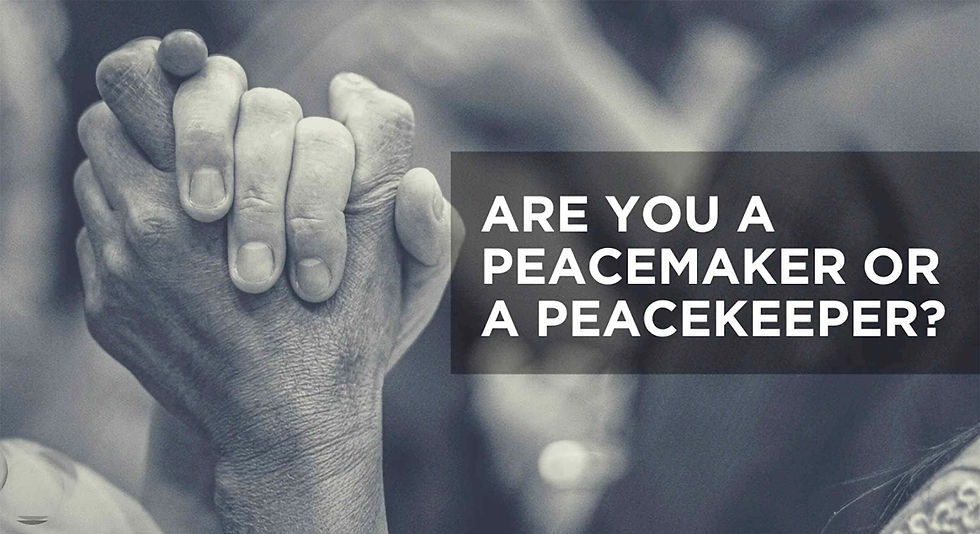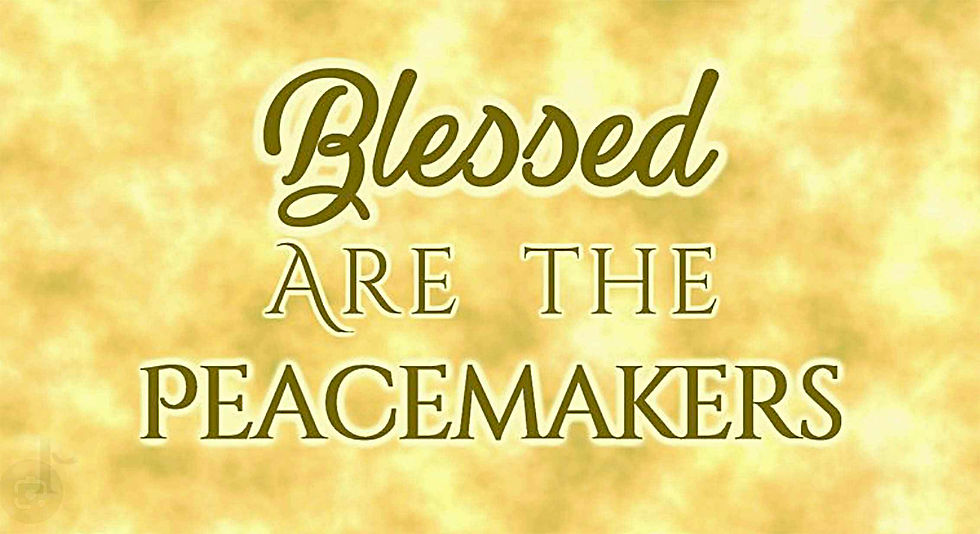Walking on eggshells!
- Chris Finn

- Dec 15, 2023
- 5 min read

But I need to keep the peace!
“How wonderful, how beautiful, when brothers and sisters get along! It’s like costly anointing oil flowing down head and beard, flowing down Aaron’s beard, flowing down the collar of his priestly robes. It’s like the dew on Mount Hermon flowing down the slopes of Zion. Yes, that’s where God commands the blessing, ordains eternal life”. Psalm 133 MSG
Unity attracts God's presence! “It is absolutely clear that God has called you to a free life. Just make sure that you don’t use this freedom as an excuse to do whatever you want to do and destroy your freedom. Rather, use your freedom to serve one another in love; that’s how freedom grows. For everything we know about God’s Word is summed up in a single sentence: Love others as you love yourself. That’s an act of true freedom. If you bite and ravage each other, watch out—in no time at all you will be annihilating each other, and where will your precious freedom be then?” Gal 5:15 MSG
Unity means getting along, but is it that simple? We can have unity in both good and bad situations. I can be in unity with another person by gossiping and causing strife, or I can be in unity with someone else by building them up and speaking well of them. If I want the presence of God in my life then I have to choose to be a peacemaker.
I grew up in a home where the goal was to “keep the peace”. As I grew up I learned the ground rules for peacekeeping. Peacekeepers walk on eggshells so as not to upset anyone; peacekeepers don’t share how they really feel so as not to start an argument; peacekeepers avoid conflict and apologise for things that they haven’t done. Peacekeepers often feel taken advantage of and find their identity in not making waves. We have confused peacemaking with peacekeeping. A typical belief system for peacekeepers is that we need to take one for the team! If we have been hurt then pursuing peace is keeping quiet, or not speaking truth, or just sharing partial truth.
Passivity is equated with peacekeeping, a thinking that we are doing what is best for the relationship. The byproduct of living like this is resentment, passive aggressiveness and hurt, leading to surface level relationships with no real depth. We often think that we are helping the relationship by keeping the peace but we are actually fracturing it more.
Some relationships are toxic and not open to peacemaking and therefore become an unsafe environment. We have to use wisdom in what and when to speak. The goal is for unity not for the opportunity to score points! A peacekeeper can also facilitate and allow others to continue to behave badly. It took me many years to change. It was only when I had to deal with the collapse of a relationship that I realised that I had been peacekeeping rather than peacemaking. Change is a process that takes time and commitment. For me it involved the healing of hurts, forgiveness and repentance.
Becoming a peacemaker involves being committed to truth, truth about ourselves and others, without being judgemental. It involves having the ability to speak the truth in love. When a peacemaker is offended or hurt they communicate and share their feelings honestly. When they hurt others, they own up to their mistakes and ask for forgiveness. They know that withholding truth will never lead to intimacy. This is a journey that starts with a choice to be obedient to God’s word. I don’t always succeed in my efforts to be a peacekeeper, but then I remember that I am on a journey and as long as I stay committed to that journey then I know that I will succeed.
Peacemakers are humble enough to pray for those that hurt them. I have discovered that an amazing thing happens when I pray for someone who has hurt me (this may take me time as I have to have my rant and rave first). God changes my heart, He shows me how He sees them and gives me compassion and enables me to see beyond the situation. Some relationships are more important and valuable than the need to be right all the time. Having to be right at any cost is a selfish position. We become more concerned with how we feel or view ourselves than the health of the relationship, success of the job, or well-being of the team. Conflict is an opportunity and when handled in a healthy way can become a powerful catalyst for change. Relationships that practice healthy conflict resolution tend to be stronger, more rewarding and fruitful.
Jesus knew that the way to establish His kingdom, which includes peace, was to boldly attack the godless powers that were ruling. Jesus wasn’t a peacekeeper, he was a peacemaker! (Matt 10:34) There’s a cost to peacemaking. Peacemakers are often accused of being unloving, judgmental, trouble makers and legalistic or intolerant. When they point out improper behaviour or double standards, all too often they are vilified and the guilty party gets off scot free.
Jesus’ only crime was telling the world the truth (Jn 18:37). Peacemakers continue to confront injustice with truth filled words, grace, mercy and compassion even if it costs them their reputation, career or ultimately their life. (Luke 9:24, Acts 21:13, Romans 8:18-19) Avoidance isn’t peacemaking and avoiding conflict will never build intimacy. You will never grow closer to your sister by ignoring her; you will never reconcile with your Dad by not going home for Christmas. You will never grow closer in your marriage by pretending there is no conflict. Sometimes the best way to build peace is to embrace confrontation. Confrontation doesn’t have to be a negative experience.
A good mediator can help navigate conflict and help us to re-focus on common goals, as well as addressing specific issues to help stop the slinging of mud. It’s the truth that you know and act upon that sets you free!
As you become a peacemaker, you will be able to teach someone else and will begin to see the reality of Psalm 133 in your own life. When God commands the blessing, we are truly blessed in all areas; we have peace.
Keeping the peace is one thing but being a peacemaker is better.
Have you been a peacemaker?
If you haven’t, take the time to see the reasons why.
Forgive those who provided this example to you: Parents/spouse/friends. Those who didn’t listen to you or who squashed you when you took a stand.

Make a choice to be a peacemaker and ask the Holy Spirit to teach you what this looks like in your life.



Comments